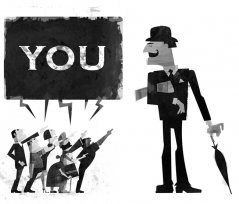Blame. What is it good for?
 Why do we blame other people: Revenge or to change their behavior? (Illustration by Norm Konyu, http://www.mooseboy.co.uk/)
Why do we blame other people: Revenge or to change their behavior? (Illustration by Norm Konyu, http://www.mooseboy.co.uk/)
Humans blame, and perhaps only humans do, but what is blame for? Is blame about meting out retribution and revenge? Or is blame a tool for managing others’ behavior? I argue that while the former answer is dominant in social psychology, it predicts a dysfunctional system of blame that explains only a small portion of why people blame. Instead, I suggest that blame is better understood as a tool for changing the way people behave.
Before answering the question: “What is blame for?” one must define what blame is. In this post, I suggest that blame should be defined as a social act rather than a private judgment. Thinking nasty thoughts about someone won’t change their behavior nor will it help in “getting even”. For blame to be an effective means for either vengeance or behavior modification it must be expressed publicly toward a specific recipient.
With this definition in hand, let’s consider what blame should accomplish. If blame is for retribution, then its measure of effectiveness would be whether it makes the blamer feel better. Is the score settled? Did you get even? Did the other person pay for what she did? On this view, blaming would be driven primarily by a desire for vengeance (e.g., “I want to make sure she pays.”) and associated emotional reactions (e.g., anger, disgust). By contrast, reasoning about evidence (e.g., causality, intention, reasons, preventability) would likely follow afterward as a means of rationalizing blame.
This view is championed by various models of moral judgment. These theories characterize blame as shooting-first and asking questions later (e.g., Alicke, 2000; Ditto, Pizarro, & Tannenbaum, 2009; Haidt, 2001; Pettit & Knobe, 2009). That is, blame comes first, and people invent explanations or alter their perceptions of reality to suit or strengthen their already-made judgment (See Knobe’s recent interview on Edge.org for one example of this view).
This explanation for blame may accurately capture some cases of blame gone awry – everyone can imagine a furious reaction to being cut off on the highway or an argument that escalates out of hand. It may also capture people’s reactions to extreme harm (e.g., murder or rape). However, for everyday social expressions of blame (e.g., reactions to missed appointments, broken promises, or minor harm) these theories predict a highly dysfunctional system of blame characterized by vendetta and vengeance. Or, put less apocryphally, if blame is about punishment and retribution, then blame should pull people apart rather than binding them together.
Yet, research on cooperation points in the opposite direction. Blaming actually makes people more helpful and cooperative (Balliet, Mulder, & Van Lange, 2011; Boyd & Richerson, 1992). Blame puts people in a metaphorical doghouse. To get out, one must atone by some other good deed. If I forget to share my Mastodon meat from yesterday’s hunt, I can make it up by sharing double today. In this way, blame plays the role of a social regulator (a sort of social police force) that helps groups stay together and thrive (Cushman & Macindoe, 2009). The blame-as-retribution explanation also fails to capture the everyday experience of blame where blame is negotiated. Accused persons offer explanations, excuses justifications, counterarguments, and perceivers weigh this information and update blame (mitigating and exacerbating) in response.
A better explanation of these data and of everyday experiences may derive from framing blame as a social tool for managing the behavior of others. This frame places particular constraints on the expression of blame. Specifically, it requires that blame be warranted (Malle, Guglielmo, & Monroe, 2012, 2014). Blame must be fair (i.e., not too harsh), and blame must be based on shared social-cultural values (e.g., fairness, loyalty, do no harm). Unwarranted blame is likely to be rejected by recipients and therefore ineffective at altering behavior. Additionally, unwarranted blame (e.g., blaming too harshly) may be subject to blame itself.
The requirement for warrant mean that people are motivated to produce calibrated, “correct” judgments. This predicts careful attention to morally relevant information (e.g., intention, causality, reasons, and preventability), which matches evidence in the literature (c.f., Cushman, 2008; Young & Saxe, 2009) and explains why blame leads to more cooperation.
Judgments that are warranted via shared social-cultural values carry the weight of the shared community with them — rejecting the judgment is akin to rejecting the community’s norms and values, which may place one at risk of expulsion from the community. Moreover, providing warrant via reference to the agent’s mental states or causal role makes it more difficult for a wrongdoer to reject blame. By providing judgments that are warranted (by community norms and moral information) the social community offers blame-recipients a choice: Affirm the community’s norms by repenting and reforming or break with the community.
If you imagine a conflict with a friend, significant other, or any other person with whom you expect to repeatedly interact, it seems like the above accurately describes the information people care about how people negotiate blame. For example, when your partner eats all of your French fries at dinner (despite insisting that she doesn’t want to order any for herself), you might appeal to social norms of fairness (“Those were mine.”); highlight the degree of harm inflicted (“I was really looking forward to eating those fries.”); reference her morally-relevant mental states (“You knew that I ordered those fries especially for me.”) in your pronouncement of blame. Your partner is then left with a choice to either modify her behavior in the future or to reject your feelings and norms of fairness as important to her.
Compared to framing blame as primarily concerned with retribution, viewing blame as a tool for behavior modification arguably better captures blame as it emerged during early communal living as well as describing blame in groups, cultures, and dyadic relationships. According to this view, when people point the finger of blame they (generally) do so with the goal of reforming others rather than avenging themselves.
References:
Alicke, M. D. (2000). Culpable control and the psychology of blame. Psychological Bulletin, 126, 556–574.
Balliet, D., Mulder, L. B., & Van Lange, P. A. M. (2011). Reward, punishment, and cooperation: a meta-analysis. Psychological Bulletin, 137, 594–615.
Boyd, R., & Richerson, P. J. (1992). Punishment allows the evolution of cooperation (or anything else) in sizable groups. Ethology and Sociobiology, 13, 171–195.
Cushman, F. (2008). Crime and punishment: Distinguishing the roles of causal and intentional analyses in moral judgment. Cognition, 108, 353–380.
Cushman, F. A., & Macindoe, O. (2009). The coevolution of punishment and prosociality among learning agents. Proceedings of the 31st annual conference of the cognitive science society.
Ditto, P. H., Pizarro, D. A., & Tannenbaum, D. (2009). Motivated moral reasoning. In D. M. Bartels, C. W. Bauman, L. J. Skitka, & D. L. Medin (Eds.), Moral judgment and decision making, The psychology of learning and motivation; Vol 50; 0079-7421 (Print); (Vol. 50, pp. 307–338). San Diego, CA US: Elsevier Academic Press.
Haidt, J. (2001). The emotional dog and its rational tail: A social intuitionist approach to moral judgment. Psychological Review, 108, 814–834.
Malle, B. F., Guglielmo, S., & Monroe, A. E. (2012). Moral, cognitive, and social: The nature of blame. In J. P. Forgas, K. Fiedler, & C. Sedikides (Eds.), Social Thinking and Interpersonal Behavior, Sydney symposium of social psychology (pp. 313–331). New York, NY US: Psychology Press.
Malle, B. F., Guglielmo, S., & Monroe, A. E. (2014). A theory of blame. Psychological Inquiry, 25, 147–186.
Pettit, D., & Knobe, J. (2009). The pervasive impact of moral judgment. Mind and Language, 24, 586–604.
Young, L., & Saxe, R. (2009). An fMRI investigation of spontaneous mental state inference for moral judgment. Journal of Cognitive Neuroscience, 21, 1396–1405.

